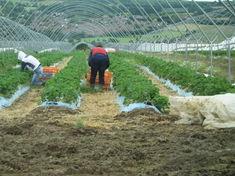
Growers have been urged to fight labour shortages by providing empirical evidence for the effects the shortfalls have had on their businesses this season.
Robert Mitchell, chairman of Concordia and a Kent top-fruit grower, told the trade at Fruit Focus last week to lobby for the removal of restrictions to the Seasonal Agricultural Workers Scheme (SAWS) and for the retention of the programme past its cut-off date in 2010.
He said the onus is on growers to prove turn-up rates, length of stay, earnings, reliability and suitability for the job, as well as provide evidence for the issues that labour shortages have caused.
He said the enlargement of the European Union “without the creation of a level playing field”, the squeeze SAWS, the increasing aspirations of the newer member states and the changing university structure in these countries - which has seen the average number of years at university drop from seven to three and therefore reduce the number of summer holidays in which they are available for seasonal labour - have all piled onto regulatory restrictions introduced this year, to spark worrying seasonal labour shortages in the UK.
He said: “There is a lot of confusion in the media about seasonal migrant workers and permanent immigration, but there is no doubt over the status of a SAWS worker - they come, they work, they go.
“If we cannot get more labour, we have to make better use of the workers we have,” he added. “At the same time, we should look at any mechanisation aid that might increase efficiency.”
Marion Regan, chairman of KG Growers, said she has succeeded in recruiting enough workers for her Kent operation, Hugh Lowe Farms, but she is concerned that the number of new arrivals is in decline.
She said: “Some 49 per cent of the workers we brought in for this season have already left. Worryingly, the only ones staying are returnees from previous seasons. We are getting fewer first-timers to take their place and the stream is drying up.
“We have to create more earning opportunities and think in terms of pounds per week, not just pounds per hour, we have to invest in accommodation ad facilities, and balance nationalities and gender.
“We cannot get away from the fact that we will always need seasonal migrant workers, and we must strive to keep and extend SAWS as a well regulated means of matching employers and employees.”



